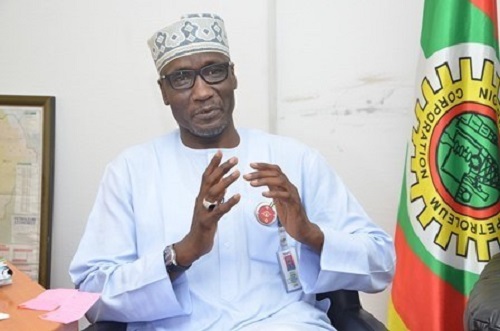This post has already been read 1598 times!
The Nigerian National Petroleum Company (NNPC) Limited started its week with an assurance to Nigerians that the distribution of Premium Motor Spirit (PMS) would soon normalise after it recalled the bad product imported into the country last week.
The NNPC Group Executive Director (GED) Downstream, Adetunji Adeyemi, gave the assurance at a briefing in Abuja, while concerted efforts were being made to end the challenges in the supply of petrol.
Adeyemi stated that the company was expecting over 2.3 billion litres of Premium Motor Spirit (PMS) in the country by the end of February and that over 1 billion litres of the product were currently being distributed nationwide.
Adeyemi explained that in order to accelerate PMS distribution across the country, the company had commenced 24 hours’ operations at its depots and retail outlets.
He disclosed that NNPC had constituted a monitoring team, with the support of the Nigerian Midstream and Downstream Petroleum Regulatory Authority (NMDPRA) and other security agencies to ensure smooth distribution of PMS nationwide.
In the meantime, Chairman, House of Representatives Committee on Petroleum (Downstream), Rep. Abdullahi Gaya, assured Nigerians that his Committee would handle companies who imported methanol-blended Premium Motor Spirit (PMS) into the country.
A statement by Mr Garba Deen Muhammad, Group General Manager, Group Public Affairs Division, NNPC Limited, quoted Gaya as responding to a question from one of the committee members in that regard.
Gaya spoke during an engagement with Management of the NNPC organised by his committee on the current fuel situation in the country.
While briefing the committee, the NNPC CEO/GMD, Malam Mele Kyari, explained that the situation came about as a result of the discovery of methanol in the PMS cargoes shipped to Nigeria under the subsisting commercial contract operated by NNPC and its partners.
According to Kyari, tests did not reveal methanol presence because Nigeria’s specifications do not include methanol.
“We are a law-abiding company. There is no way we could have known about the methanol presence.
“The only way we could have known about it is if our suppliers, in good faith, made the disclosure to us.
“In this particular instance, the discovery was made by our inspection agents who noticed the emulsification at the filling stations and brought it to our attention.
“Subsequent investigation revealed that the four cargoes which are all from the same source also contained methanol-blended PMS,” Kyari said.
While assuring the Committee and Nigerians that measures have been put in place to accelerate fuel supply and distribution in the country, the NNPC CEO said the company had placed significant orders of over 2.1billion liters of methanol-free PMS to ensure the queues vanish in few days.
He pledged that NNPC would co-operate with the committee and the Nigerian Midstream and Downstream Petroleum Regulatory Authority (NMDPRA) to get to the root of the matter.
The NNPC CEO also expressed deep empathy with Nigerians on the current situation and assured that adequate measures have been put in place to maintain supply sufficiency and prevent future occurrence.
Also in the week, the ongoing rehabilitation works on the Port Harcourt Refining Company (PHRC) was applauded by three former Managing Directors (MDs) of the Company.
The MDs who visited the refinery on an inspection of the ongoing rehabilitation advised PHRC Management to ensure that members of staff use the opportunity of the rehabilitation to acquire specific expertise on key operational areas.
The three former MDs are Dr Bafred Enjugu, who was in-charge from 2014 to 2017; Mr Shehu Malami, who was the MD from 2017 to 2018 and Engr. Abba Bukar, the immediate past MD who retired in March 2020.
They expressed delight at being able to inspect the ongoing works and advised the management to manage cost and ensure a successful completion of the rehabilitation.
In his remarks Mr Abba Bukar thanked PHRC management for the opportunity to see firsthand, the ongoing works and staff who worked with him when he was at the helm of affairs at the refinery.
To manage the overall cost of the project, Bukar advised PHRC management to evaluate all the warehoused spare parts to determine those that can be used in the ongoing rehabilitation as a way of saving cost.
On his part, Mr Shehu Malami called on the management and staff of PHRC to ensure the successful completion of the rehabilitation project within budget, as it was in the interest of all PHRC staff, whether serving or retired.
He commended PHRC for achieving ISO recertification and enjoined the management team to ensure that proper processes and procedures were adhered to especially in the course of the rehabilitation.
In his remarks, Dr Bafred Enjugu advised PHRC management to use the opportunity offered by the ongoing rehabilitation to build skills and expertise in specific areas like rotating equipment, electrical and mechanical engineering.
Furthermore, he said PHRC Management should pay attention to the rehabilitation project by ensuring that products that would later be refined in the plants would be of standard in quality and to specification.
Earlier, the serving MD of PHRC, Dikko described the visiting former MDs as professionals who gave their best to NNPC and the refining sector in the country as they all worked both in Kaduna Refining and Petrochemical Company (KRPC) and PHRC.
He said that by coming to see the ongoing rehabilitation, the former MDs had demonstrated the spirit of camaraderie, as their visit and support for the project would boost the spirit and morale of staff.
Dikko said the visit showed that staff who retired from the system still had pivotal roles to play in the activities of the company.
He briefed the former MDs on the progress made on the refinery rehabilitation and the Corporate Social Responsibility efforts being made for host communities.
Dikko said these efforts had led to relative peace and assured that PHRC would continue to work with hosts communities through honest engagements and social investments that would create mutual benefits.



